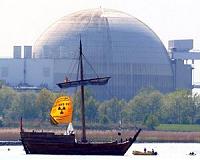 |
Tokyo (AFP) May 10, 2011 The president of TEPCO on Tuesday submitted a request for Japanese government aid in compensating those affected by its stricken nuclear power plant, as the utility said it faced funding problems. Presenting the request to trade and industry minister Banri Kaieda, Masataka Shimizu told reporters that TEPCO would undertake bold restructuring measures to help pay for damages caused by the world's worst nuclear accident for 25 years. Tokyo Electric Power (TEPCO) said in the submitted document that the company faced "an extremely severe situation regarding fund-raising such as loans from financial institutions, not to mention bond issuance." The company said it needed state help to continue operating and avoid a scenario that threatened "fair and prompt compensation to affected people and causing fears over stable supply of electricity." Some analysts have forecast that the utility faces compensation claims totalling around 10 trillion yen ($125 billion). The government is expected to decide on an assistance package for TEPCO later this week. The cooling systems of the Fukushima Daiichi Plant were crippled by the March 11 tsunami following Japan's biggest recorded earthquake, causing reactors to overheat, triggering explosions and the release of radioactive materials. The worst nuclear disaster since Chernobyl in 1986 has forced the evacuation of tens of thousands of people from their houses, businesses and farms in a 20-kilometre (12-mile) radius around the plant. The Japanese government has said TEPCO must undertake greater restructuring in order to win its support. TEPCO said Shimizu and seven other representative directors would return their renumeration "for the time being" and the company would look at selling securities holdings and real estate to create "as much funds as possible". This would also include "streamlining businesses", the document added. TEPCO had already announced salary cuts of 50 percent for board members, but some government officials criticised the move as too lenient considering their average salary was 37 million yen ($461,000) in the year to March 2010. The beleaguered firm said it was also struggling with the costs of extra power generation, including an additional one trillion yen for fossil fuel, with its Fukushima Daiichi plant and other facilities offline following the March 11 disasters. One of the world's biggest power companies, TEPCO supplies the Kanto region including Tokyo at the economic heart of Japan and boasts 44.6 million customers -- more than one third of the population. "Amid increasing dependency on thermal power generation, we need a considerable amount of funds as seen in nearly one trillion yen of additional costs for surging fossil fuel (prices)" for the year to March 2012, it said. The government has said that it will ensure there is funding for compensation payments and is studying various possible approaches. The Yomiuri Shimbun on Tuesday reported that the government is considering taking an equity stake in TEPCO. The devastating March 11 earthquake and tsunami crippled the Fukushima Daiichi plant, with authorities and TEPCO still battling to bring the facility to safety more than eight weeks later. Nearly 100 evacuees from a village near the Fukushima plant briefly returned home Tuesday in radiation suits, masks and goggles to pick up personal belongings. TEPCO shares closed up 3.19 percent Tuesday but are still nearly 80 percent below pre-March 11 levels. Chubu Electric Power Co., which bowed to government demands to shut down its only nuclear plant, plans to seek emergency loans worth billions of dollars from big banks due to extra power generation costs, the Yomiuri said. The government said it may provide financial help.
Share This Article With Planet Earth
Related Links Nuclear Power News - Nuclear Science, Nuclear Technology Powering The World in the 21st Century at Energy-Daily.com
 Germany at 40% nuke capacity, no issues
Germany at 40% nuke capacity, no issuesBerlin (UPI) May 9, 2011 Only 10 out of the 21 nuclear reactors in Germany are currently running and there haven't been any power outages, suggesting that government plans to drop nuclear could be realized quicker than expected. In March, at the height of the nuclear crisis in Japan, German Chancellor Angela Merkel decided to shut down for three months seven of Germany's oldest reactors to test their safety, ad ... read more |
|
| The content herein, unless otherwise known to be public domain, are Copyright 1995-2010 - SpaceDaily. AFP and UPI Wire Stories are copyright Agence France-Presse and United Press International. ESA Portal Reports are copyright European Space Agency. All NASA sourced material is public domain. Additional copyrights may apply in whole or part to other bona fide parties. Advertising does not imply endorsement,agreement or approval of any opinions, statements or information provided by SpaceDaily on any Web page published or hosted by SpaceDaily. Privacy Statement |